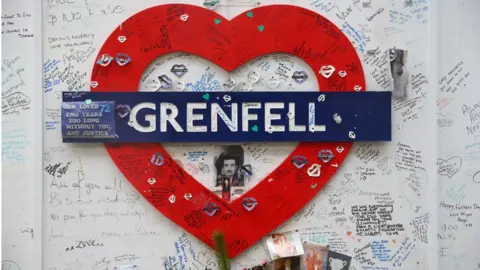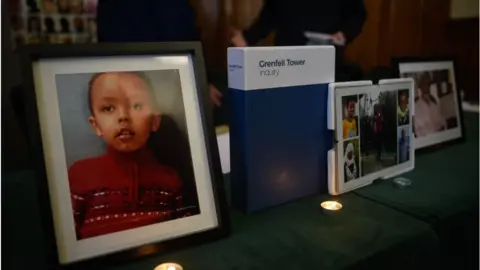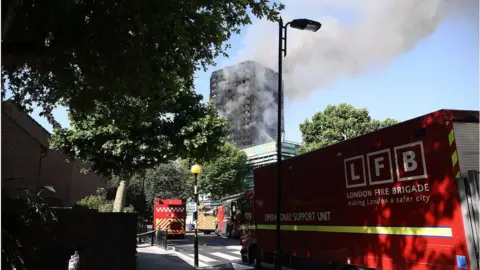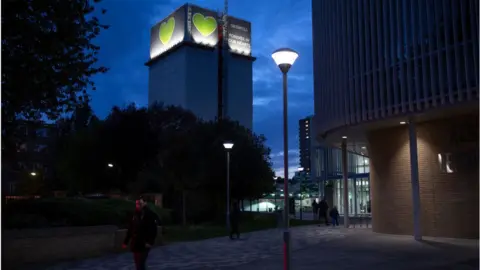Grenfell Tower: Most fire brigade recommendations in place, LFB says
 Getty Images
Getty ImagesAll but three of the recommendations made to the London Fire Brigade (LFB) by the Grenfell Tower Inquiry will be in place by 2022, the service said.
The progress report has been published a day after the inquiry heard "harrowing" extracts read out from 999 calls made on the night of the disaster, in which 72 people died.
A lawyer for some of the residents argued the calls "laid-bare institutional failure".
Of the 29 actions, 23 have been taken.
A further three improvements are due to be implemented in December, the LFB said. The rest are in progress but are on hold until new equipment, such as radios that can be used while wearing both a helmet and breathing apparatus, is bought.
The inquiry heard on Thursday that the LFB control room operators made mistakes including not gathering basic information, which affected the ability of residents to leave the building.
 Getty Images
Getty ImagesLeslie Thomas QC highlighted the case of the El-Wahabi family, who were told by the call handler for nearly an hour to stay in their flat, even when smoke was seeping in and they could see flames next door - advice Mr Thomas said was evidence of the "stay put" strategy having "become a doctrine".
He added: "In their final calls, the desperation and their fear is tangible; the response of the operator is blunt and callous."
Mr and Mrs El-Wahabi and their three children all died in the fire.
 Getty Images
Getty Images
The Grenfell Tower Inquiry
It was created to examine the circumstances leading up to and surrounding the fire at Grenfell Tower on the night of 14 June 2017.
The investigation has been separated into two phases: Phase 1 focused on the factual narrative of the events, and concluded on 12 December 2018.
Phase 2 is examining the causes of these events, including how Grenfell Tower came to be in a condition which allowed the fire to spread in the way identified by Phase 1.

 Getty Images
Getty ImagesThe LFB said it had "accepted every recommendation from the inquiry and, over the past two years, has implemented multiple changes to the way it operates, as it continues to learn lessons from the fire and works to keep Londoners safe".
All staff have had extra training, and new policies have been developed "to help mitigate risk".
"Smoke hoods", allowing residents to be evacuated from buildings more safely, have also been provided.
London Fire Commissioner Andy Roe said: "We know that we owe it to the bereaved families, the survivors and the residents - whose lives have been torn apart by what happened that night - to learn, change our service, and improve. I know that the progress we have made following the disaster means that we are now in a better position to protect every Londoner.
"We also continue to have detailed discussions with community representatives, in Kensington and across London, on how we can serve them better as we - and the city - transform."
Mayor of London Sadiq Khan said: "I remain deeply concerned that four years on from the Grenfell tragedy those in high-rise building are still living in fear.
"That's why I'm calling on the government, developers and building owners to act now and make the urgent changes needed to remove flammable cladding and material on balconies that could contribute to the spread of fire, and to fully cover the cost of interim safety measures.
"I am personally committed to continuing to do everything within my power to ensure the Grenfell community gets the justice they deserve, and all Londoners can feel safe again in their homes."
